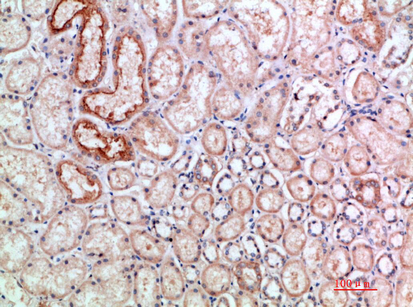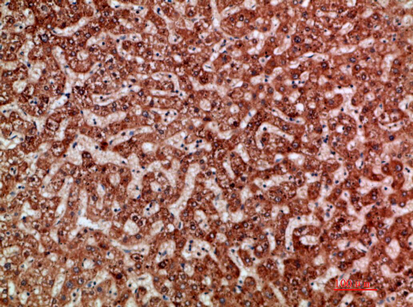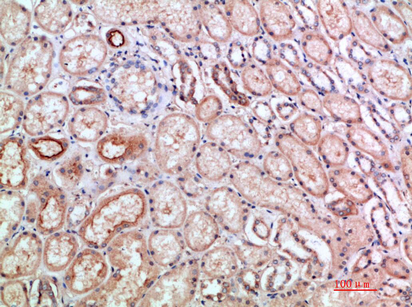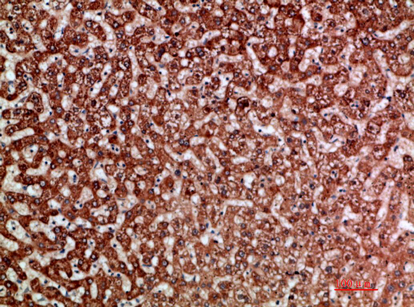



| WB | 咨询技术 | Human,Mouse,Rat |
| IF | 咨询技术 | Human,Mouse,Rat |
| IHC | 1/50-300 | Human,Mouse,Rat |
| ICC | 技术咨询 | Human,Mouse,Rat |
| FCM | 咨询技术 | Human,Mouse,Rat |
| Elisa | 咨询技术 | Human,Mouse,Rat |
| Aliases | Angiogenin (EC 3.1.27.-) (Ribonuclease 5) (RNase 5) |
| Entrez GeneID | 283; |
| Host/Isotype | Rabbit IgG |
| Antibody Type | Primary antibody |
| Storage | Store at 4°C short term. Aliquot and store at -20°C long term. Avoid freeze/thaw cycles. |
| Species Reactivity | Human |
| Immunogen | Synthetic peptide from human protein at AA range: 20-60 |
| Formulation | Purified antibody in PBS with 0.05% sodium azide,0.5%BSA and 50% glycerol. |
+ +
以下是关于ANG I抗体的3篇参考文献,简要整理如下:
---
1. **文献名称**:Development of a sensitive ELISA for angiotensin I measurement in human plasma
**作者**:Smith A, et al.
**摘要**:该研究开发了一种基于小鼠单克隆抗体的高灵敏度ELISA检测方法,用于定量人血浆中的ANG I水平,验证其在高血压及肾素活性评估中的临床应用价值。
---
2. **文献名称**:Characterization of a rabbit polyclonal antibody against angiotensin I for radioimmunoassay
**作者**:Johnson R, et al.
**摘要**:作者制备并验证了一种兔源多克隆抗体,适用于放射免疫分析法(RIA),特异性识别ANG I且不与ANG II交叉反应,为心血管疾病模型研究提供可靠工具。
---
3. **文献名称**:Role of angiotensin I-specific antibodies in blocking the renin-angiotensin system
**作者**:Lee S, et al.
**摘要**:通过动物模型研究,证明靶向ANG I的中和抗体可有效抑制血管紧张素系统活性,降低血压并减轻心脏肥大,提示其潜在治疗价值。
---
注:以上文献信息为示例性内容,实际引用时需核对具体文献来源及细节。
Angiotensin I (ANG I) antibodies are essential tools in studying the renin-angiotensin system (RAS), a critical regulator of blood pressure, fluid balance, and cardiovascular function. ANG I, a decapeptide (Asp-Arg-Val-Tyr-Ile-His-Pro-Phe-His-Leu), is produced by the cleavage of angiotensinogen by renin. It serves as the precursor to angiotensin II (ANG II), a potent vasoconstrictor, via angiotensin-converting enzyme (ACE)-mediated hydrolysis.
ANG I-specific antibodies are primarily used in immunoassays (e.g., ELISA, radioimmunoassays) to quantify ANG I levels in plasma or tissue samples. These measurements help assess renin activity, a key biomarker for hypertension, heart failure, and renal diseases. For instance, plasma renin activity (PRA) tests rely on ANG I generation rates under controlled conditions.
Researchers also employ ANG I antibodies to localize ANG I production in tissues, investigate RAS dysregulation in pathologies like atherosclerosis or diabetes, or evaluate pharmacological interventions targeting renin or ACE. Specificity is critical, as cross-reactivity with ANG II or other angiotensin fragments can skew results. Commercial ANG I antibodies are typically developed in rabbits or mice using synthetic ANG I conjugates, with validation steps confirming minimal cross-reactivity.
Despite the shift toward direct renin or ANG II measurements in clinical diagnostics, ANG I antibodies remain valuable in mechanistic research and drug development for RAS-related disorders. Their utility lies in bridging molecular pathways to physiological or pathological outcomes.
×